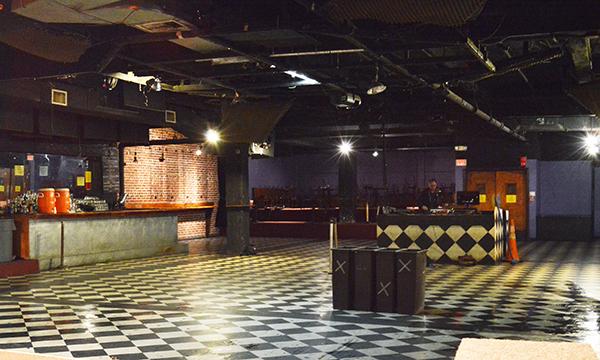Updated: Nov. 11, 2014 at 12:38 a.m.
Amid a sold-out crowd donning “Anchovy Warhol” graphic T-shirts last March, Macaulay Culkin took 10 boxes of pizza and passed them out to the audience slice by slice.
During their North American tour in 1995, Radiohead played “Creep” to a partially full venue.
It just goes to show how far the Black Cat has come since the music hall opened in 1993, and how intimate the space feels for artists who choose to perform there.
When the Black Cat opened, the only large music venue in D.C. was the 9:30 Club, and Dante Ferrando, a restaurant owner and drummer in D.C. punk rock bands Gray Matter and Iron Cross, said he was dissatisfied with the city’s music halls.
“There were very few options,” Ferrando said.
Ferrando, a fourth-generation bar owner, took what he learned from his father’s restaurant and opened the Black Cat, the four-part music hall on 14th Street. Foo Fighters frontman Dave Grohl is a primary investor in the venue.
“We saw [Grohl] sitting at the bar one night. And then we spent 10 minutes trying to figure out if it was actually Dave Grohl or not,” said Alex Kozen, the drummer for D.C. punk band BRNDA and a two-time performer at the Black Cat.
Its legendary 700-person main concert room – known to concertgoers by its black-and-white-tile floor – and smaller 200-person backstage room have showcased internationally renowned artists like Moby and the Foo Fighters, and homegrown bands like GW student-led indie rock band Bencoolen.
Aside from the blacked-out music halls and low-lying stages, the Black Cat also boasts a Red Room Bar that performers frequent before their shows, as well as the vegetarian-friendly coffeehouse Food For Thought Cafe. Ferrando said the shop, which he named after his father’s Dupont Circle restaurant, is as important to him as the main stage.
The Black Cat has grown to replace d.c. space, a grungy music hall that was popular in the late 1970s and closed in 1991, as a place for musicians to jam and drink. Many of the Black Cat’s former employees are d.c. space veterans.
“It was the opening of the Black Cat that really put Washington on the map. You know, it was the punk place,” said G. Bernard “Bernie” Wandel, the Black Cat’s former general manager who’s now a yoga instructor.

Ferrando’s wife, Catherine, said building relationships with bands early in the venue’s history was easier because it was, at the time, the largest room in the city.
But in 2001, the Black Cat moved three doors south from its original building, which used to house a gothic-themed club called The Cage, and into a substantially larger space.
“It was a very run down, very small space and it had been a really good club, but a really good, really tiny club and they were packing bands that were way too large for this tiny room,” Ferrando said.
Ferrando closed the old club to move on the eighth anniversary of its opening, which was also the day before the Sept. 11, 2001 terrorist attacks on the World Trade Center. He and Wandel opened the new club on Sept. 13.
“It didn’t take a huge leap of brain power to [realize] people need a place to let off some steam, party and do stuff,” Wandel said.
At first, it was difficult for Ferrando and his crew to fill the 7,000-square-foot space. The 14th Street neighborhood wasn’t lively back then, Ferrando said, and people from the suburbs rarely made their way that far into the center of the city.
That’s why shows like Radiohead’s didn’t sell out.
The Black Cat doesn’t have that problem now. Just two weeks ago, fans snaked down the street to stand in line for hours to get tickets for a last-minute Foo Fighters show. The venue sold out five minutes after tickets were said to have gone on sale.
“D.C.’s not very responsive to artificial hype as much as a lot of other cities are,” Ferrando said. “People tend to go out to things that they want to see. If it’s something that they don’t know or don’t really want to see, it’s really impossible to twist their arm and get them to go out to it.”
That’s why the Black Cat team pushes some shows and packages together multiple acts for others. Many times, they match local groups with well-known touring bands. In February, they paired Shark Week – a well-known local rock band – with Bass Drum of Death, a nationally-renowned group with a similar sound.
“I like it to be an arts and music scene hangout,” Ferrando said. “I like it to be a place that’s thought of as being comparatively reasonably priced and does good music, and a place that’s fairly true to what we like to do.”
This post was updated to reflect the following corrections:
The Hatchet incorrectly reported that the Black Cat moved on Sept. 10, 2001. It actually closed that day, and it took three days to move. The Hatchet also incorrectly reported that the club opened on Sept. 11, 2001. It opened on Sept. 13, 2001. We regret these errors.








